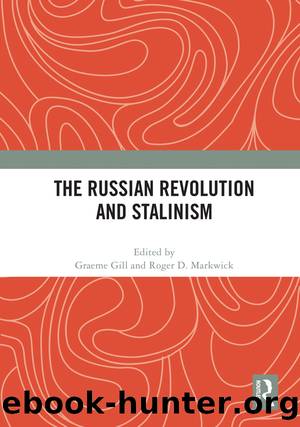The Russian Revolution and Stalinism by Graeme Gill & Roger D Markwick

Author:Graeme Gill & Roger D Markwick [Gill, Graeme & Markwick, Roger D]
Language: eng
Format: epub
Tags: History, Russia & the Former Soviet Union, Political Science, General, Political Ideologies, Communism; Post-Communism & Socialism, World, Russian & Former Soviet Union
ISBN: 9781000375992
Google: wAAaEAAAQBAJ
Goodreads: 55826207
Publisher: Routledge
Published: 2021-04-25T13:38:06+00:00
Doubting Soviet nationality policy
The first reason for doubting the existence of a Soviet nationality policy is the official Soviet use of the term. Following publication of the 1919 programme of the Russian Communist Party (RCP) (Programma 1919), official statementsâspeeches, Party programmesâconsisted of little more than platitudes concerning the âfriendship of peoplesâ, expressed in varying forms. The 1961 Party programme, for instance, talked of âa further drawing together of nations and achieving their complete unityâ. Soviet nationalities were âall united in one family by common vital interests and together march towards the single purposeâcommunismâ (Programme 1961). The programme went on to acknowledge that national distinctions were not going to disappear imminently, leaving little in the way of concrete guidance as to what policies communists and Soviet institutions should pursue with regard to nationality (Titov 2009). Towards the end of the Soviet era the 1985 draft of Gorbachevâs new Party programme did not depart much from this formula, referring to the âfurther flourishing of nations and ethnic groups and their steady drawing togetherâ (Nahaylo & Swoboda 1990, p. 236). Both programmes, like most earlier statements, were declarations of an idealised understanding of the current situation, not a guide to action.
The second reason for questioning the relevance of âSoviet nationality policyâ and seeing it as little more than an empty phrase is the frequency with which it is prefaced with the words âcontradictions ofââ¦ââ. It is not unreasonable to suppose the policy was riven with contradictions, given the official stress on simultaneously preserving difference while striving towards unity implied in the two Party programmes cited above. The phrase âcontradictions of nationality policyâ (or something very close to it) can be found in the writings of such prominent scholars as Mark Beissinger, Dmitry Gorenburg, Henry Huttenbach, David Laitin, Peter Rutland and Valery Tishkov, as well as being repeated by authors who do not specialise in nationality policy (Osipov 2016). For example, a scholar who understands Soviet nationalities issues probably better than anyone, Ronald Suny laid out the nature of this presumed contradiction in stark terms in an early work: âthese contradictions went unresolved in official nationality policy and were reflected in the formula designed for the arts ânational in form, socialist in contentââand in the confusion over whether the goal of Soviet policy was to solidify the national or to assimilate the minoritiesâ (Suny 1989, p. 300). Apparently, one and the same policy may have had two goals, which were each the diametric opposite of the otherâto promote national difference, and to eliminate it.
The treatment of different nationalities in different ways at different times and by different levels of the Party or state was indeed a feature of the Soviet system. My argument here is not that such contradictory trends did not exist, but that it does not make sense to ascribe them to a policy or set of policies. As I shall go on to show, individual decisions were taken with regard to altogether contingent influences which had nothing to do with any general guidelines over nationality.
Download
This site does not store any files on its server. We only index and link to content provided by other sites. Please contact the content providers to delete copyright contents if any and email us, we'll remove relevant links or contents immediately.
| Arms Control | Diplomacy |
| Security | Trades & Tariffs |
| Treaties | African |
| Asian | Australian & Oceanian |
| Canadian | Caribbean & Latin American |
| European | Middle Eastern |
| Russian & Former Soviet Union |
The Secret History by Donna Tartt(19047)
The Social Justice Warrior Handbook by Lisa De Pasquale(12187)
Thirteen Reasons Why by Jay Asher(8893)
This Is How You Lose Her by Junot Diaz(6877)
Weapons of Math Destruction by Cathy O'Neil(6264)
Zero to One by Peter Thiel(5786)
Beartown by Fredrik Backman(5737)
The Myth of the Strong Leader by Archie Brown(5496)
The Fire Next Time by James Baldwin(5431)
How Democracies Die by Steven Levitsky & Daniel Ziblatt(5213)
Promise Me, Dad by Joe Biden(5141)
Stone's Rules by Roger Stone(5081)
A Higher Loyalty: Truth, Lies, and Leadership by James Comey(4951)
100 Deadly Skills by Clint Emerson(4919)
Rise and Kill First by Ronen Bergman(4778)
Secrecy World by Jake Bernstein(4740)
The David Icke Guide to the Global Conspiracy (and how to end it) by David Icke(4699)
The Farm by Tom Rob Smith(4502)
The Doomsday Machine by Daniel Ellsberg(4484)
